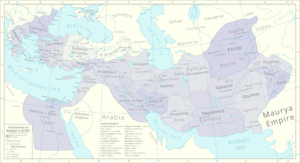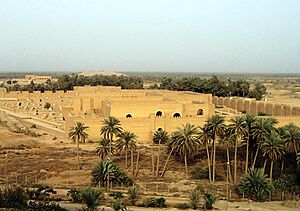Partition of Babylon facts for kids
The Partition of Babylon was a very important meeting and agreement that happened in June 323 BC in the city of Babylon. It was the first time the huge empire of Alexander the Great was divided up after he died.
Alexander was only 32 years old when he died. His empire stretched from Greece all the way to India. Because he died suddenly, there was a big problem: who would rule next? Some people supported Philip Arrhidaeus, who was Alexander’s half-brother. Others looked to Alexander’s wife, Roxana, who was pregnant with his child (Alexander IV).
At the meeting, it was decided that Arrhidaeus and Alexander’s unborn child would be joint kings. Perdiccas, one of Alexander’s top generals, would act as their regent, meaning he would rule for them until they were old enough. The empire's lands were divided into many smaller regions called satrapies. These were given to Alexander's senior army officers and some local rulers. This division led to many conflicts later on, known as the Wars of the Diadochi, which means "Wars of the Successors."
What Was the Partition?
The term "Partition of Babylon" is a modern name for this event. For many years after Alexander's death, the borders of these new regions were constantly changing.
Ancient writers described this event in slightly different ways. For example, Diodorus Siculus said that the army decided Arrhidaeus should be king. He also said that Perdiccas, who had received Alexander's ring, would be the "caretaker" or regent. The most important generals, called "companions," were given control of the satrapies. This meant the empire was being divided into parts, and these parts were given to the generals.
Another writer, Quintus Curtius Rufus, also said that Perdiccas held a meeting with the main leaders. They divided the "Empire" between the new king and the satraps. He pointed out that these men, who had been servants under Alexander, now fought to expand their own "kingdoms."
Historians today generally agree that this meeting in Babylon was indeed a "partition" or division of the empire. It was a big step towards the empire breaking into separate kingdoms.
Alexander's Death and the Council
Alexander the Great died on June 11, 323 BC, very early in the morning. The day before, he had given his signet ring to Perdiccas, his second-in-command. Some say Alexander knew he was going to die and that his death would cause chaos. This was not surprising, as he had faced rebellions from his Macedonian soldiers even before his journey to India. He was also covered in old wounds and had been very sick for days before he died.
The Council in Babylon
On the day Alexander died, his bodyguards, called the Somatophylakes, called a meeting. They invited the main cavalry officers (Hetairoi) and infantry leaders to the royal palace. However, regular soldiers pushed their way in, taking up space and forcing many officers out. The bodyguards eventually let them stay and vote.
Perdiccas started the meeting by showing Alexander's empty chair. On it were his crown, robe, armor, and signet ring. Seeing these items made the crowd very sad. Perdiccas told them that the gods had given them Alexander for a time, and now he was gone. He reminded them that they were conquerors in a land they had taken over. He said it was important for them to have a "head" or leader. He asked them to choose someone to rule.
Different Ideas for a New Leader
Nearchus, who commanded the fleet, suggested that Heracles, Alexander's son with a Persian woman named Barsine, should be king. But the soldiers voted against this. Ptolemy then said it would be a shame to choose either of Alexander's children because their mothers were "captives." He wondered what good their conquests would be if the conquered people ruled the conquerors.
Aristonous of Pella then suggested that the signet ring should be given back to Perdiccas, as Alexander had chosen him. This idea was very popular. Perdiccas hesitated, which some saw as him refusing the position. His enemies quickly took advantage of this.
Meleager saw a chance to attack Perdiccas. He argued that choosing either Perdiccas or Heracles would mean Perdiccas would still be the "guardian" anyway. He asked why the soldiers, if they were truly in charge, shouldn't just take money from the treasury. He even pretended to lead an armed group to do just that, causing a lot of confusion.
Then, an ordinary soldier spoke up. He shouted that there was no need for a civil war. He reminded everyone that Arrhidaeus, Alexander's half-brother, was the legal heir. He asked why Alexander's heir should lose his inheritance. The crowd became silent, then cheered loudly. Peithon tried to argue against it, saying Arrhidaeus had a mental disability, but he was shouted down.
The Generals Take Sides
Even though the soldiers voted, they weren't officially part of the council. Peithon suggested that the council appoint Perdiccas and Leonnatus as "Guardians" for Heracles, and Craterus and Antipater to "administer" Europe. These decisions were made without asking Arrhidaeus.
Meleager left and came back with Arrhidaeus, asking the soldiers for help. Now, two main groups had formed: one supporting Perdiccas, and the other supporting Arrhidaeus, led by Meleager. In the chaos, Arrhidaeus got scared and tried to escape. But the crowd called him back and put Alexander's robe on him. Meleager put on his armor, ready to defend Arrhidaeus. The soldiers were happy that the "empire" would stay in the same family. Many Macedonian soldiers didn't want to bow down to a king who was half-Persian.
Meleager's group grew very large. Perdiccas, feeling threatened, called for 600 elite Persian soldiers, Alexander's special guard, and took a defensive position around Alexander's body. These Persian guards would not support a group that rejected Alexander's children because their mothers were Persian. Fighting began, and missiles were thrown at Perdiccas's group. The situation was out of control. Senior officers with Meleager took off their helmets to be recognized and asked Perdiccas to surrender. He had no choice and laid down his weapons, followed by his guards.
Meleager told them to stay put while he looked for Perdiccas. But Perdiccas escaped to the Euphrates River, where he met up with the cavalry led by Leonnatus. It was clear that Alexander's most trusted men supported Perdiccas. Meleager sent people to ask Perdiccas to return, secretly ordering them to kill him if he hesitated. Perdiccas met them with 16 guards and criticized them. They returned without success. The day ended.
A War of Nerves
The next day, Meleager's soldiers started to have doubts when they saw who wasn't on their side. A small rebellion began. Some soldiers asked Arrhidaeus if he had ordered Perdiccas's arrest. He said he had, but only because Meleager told him to. He refused to take action against Perdiccas. The council from the day before was officially ended.
The soldiers hoped Perdiccas would send his men away, but he didn't. Instead, he cut off the city's food supply. He didn't attack the city directly because the forces inside were too strong. However, the city's defenders didn't try to break the blockade, and a famine began.
The Macedonians in the city held another meeting. They decided the king should send people to Perdiccas to ask for peace terms. Even though Perdiccas had fewer soldiers, he knew all the important generals were on his side. Eumenes, one of Alexander's officers, also tried to convince the soldiers to make peace.
Perdiccas demanded an investigation into what he called the rebellion and wanted the leaders handed over to him. Everyone knew he was after Meleager. Arrhidaeus, with tears in his eyes, told the assembly he would give up the throne rather than see more bloodshed. He offered the crown to anyone who felt they were qualified. This kindness made the assembly confirm his position as king.
Eumenes helped calm Meleager's troops. He suggested a compromise: Arrhidaeus would be king, and if Roxana's child was a son, he would be joint king with Arrhidaeus. This idea was accepted. They sent people to Perdiccas, asking for a ruling group of three: Arrhidaeus, Perdiccas, and Meleager. Perdiccas accepted, hoping to separate Meleager from Arrhidaeus. Arrhidaeus became king and was renamed Philip III. Alexander and Roxana's child, who was indeed a son, became Alexander IV.
Perdiccas's Victory
Meleager rode out with his soldiers to make a truce. As the groups met, Perdiccas’s soldiers complained about having to accept Meleager as a co-ruler. Perdiccas had encouraged these complaints. Meleager became angry. The two leaders embraced, and Meleager complained to Perdiccas about what he had heard. They both agreed to remove the troublemakers from the army.
For the reconciliation ceremony, both sides gathered under arms in a field. The king, Philip III, had talked with Perdiccas about the rebellion. As the two groups got closer, Perdiccas's men arrested 300 known leaders of the rebellion. They were immediately executed, some reportedly trampled by war elephants. Meleager was initially spared and made Perdiccas's deputy. But after the situation was under control, Meleager, seeing that he was next, took refuge in a temple, where he was killed. The army then mixed together, and the conflict was over.
The Final Division
Perdiccas, now the main guardian or regent, and with the authority of Alexander's seal ring, called a new council. This meeting was "to divide the empire." Most of the great generals were there, but three were not: Antipater (in Macedonia), Craterus (on his way to Europe), and Antigonus One-Eye (in Phrygia).
Despite this, the division happened quickly. The regions were given out as they were discussed. For example, Ptolemy asked for and received the region of Egypt. Ptolemy was one of the few who realized that focusing on a smaller goal would help him more in the long run.
Perdiccas believed he was continuing Alexander's plans to expand the empire. He insisted on having the highest authority in the name of the king. But this idea of a single empire would soon be challenged. After the division, the council decided what to do with Alexander's body, which had been unburied for seven days. The Partition of Babylon likely happened around June 18, 323 BC.
Who Got What?
Here's a simpler look at how Alexander's vast empire was divided among his generals and some local rulers:
Europe
- Macedon, Epirus and Greece: Antipater became the governor of these important regions. Some sources also say Craterus shared this responsibility.
- Thrace: Lysimachus became the governor of Thrace and the nearby areas.
Asia Minor (Modern-day Turkey)
- Greater Phrygia: Given to Antigonus, also known as "One-Eye."
- Lesser/Hellespontine Phrygia: Given to Leonnatus.
- Cappadocia and Paphlagonia: Given to Eumenes of Cardia.
- Lydia: Given to Menander.
- Cilicia: Given to Philotas.
- Caria: Most sources say Asander became satrap here.
- Lycia and Pamphylia: These regions were given to Antigonus, adding to his control.
North Africa
- Egypt, Libya and Arabia: All sources agree that these important regions were given to Ptolemy, son of Lagus. This was a very strategic choice.
Western Asia (Middle East)
- Syria: Given to Laomedon of Mytilene.
- Mesopotamia: Given to Arcesilaus.
- Babylonia: Archon of Pella was likely the satrap here.
- Persia: Peucestes became the satrap of Persia.
- Carmania: Tlepolemus was likely the satrap.
- Hyrcania and Parthia: These regions were given to Phrataphernes, who was a local Persian ruler and had governed them under Alexander.
- Lesser Media: Given to Atropates, another local Persian ruler.
- Greater Media: Peithon was likely the satrap here.
Central Asia
- Bactria and Sogdiana: Philip was likely the satrap of both these regions.
- Drangiana and Aria: Given to Stasanor.
- Arachosia and Gedrosia: Given to Sibyrtius.
- Paropamisia: Alexander's father-in-law, Oxyartes, a local Bactrian, continued to rule this region.
Indian Subcontinent
 | John T. Biggers |
 | Thomas Blackshear |
 | Mark Bradford |
 | Beverly Buchanan |



